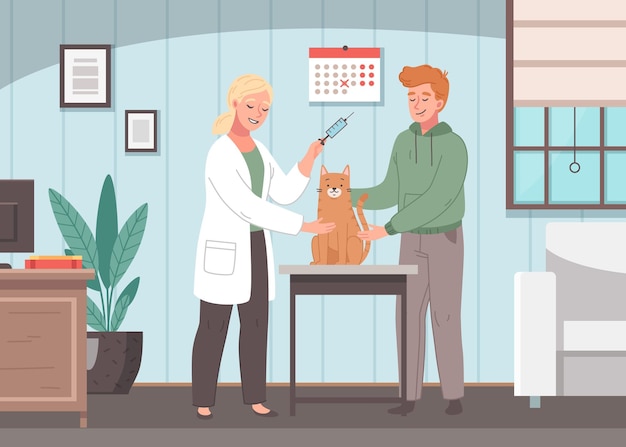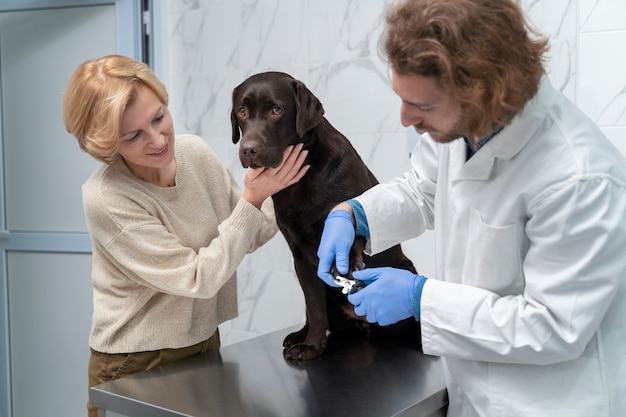Exploring Immunotherapy for Pet Cancer: Treatment Advances Explained


Exploring Immunotherapy for Pet Cancer: Treatment Advances Explained
When a beloved pet receives a cancer diagnosis, families in Coral Springs and surrounding communities often feel overwhelmed and desperate for new hope. Advances in veterinary oncology treatments are offering more options than ever, and immunotherapy for pet cancer is emerging as one of the most innovative and promising approaches. At Veterinary Cancer Health, located at 4101 Turtle Creek Drive, Coral Springs, FL 33067, our team of veterinary oncologists is dedicated to providing advanced cancer care tailored to your pet’s unique needs. In this blog, we will explain what immunotherapy is, how it fits into modern veterinary oncology, which pets may benefit most, and what to expect from this treatment option. If you are searching for an oncology vet near me or need guidance on advanced cancer care for your pet, you are in the right place. As the field of veterinary oncology evolves, understanding the latest therapies is essential for making informed decisions about your pet’s health.
To help you explore whether immunotherapy could be right for your pet, we will discuss how to recognize concerning symptoms, what causes certain cancers, the various treatment options available—including immunotherapy services for pet cancer—and when to seek expert care. Whether you are looking for veterinary oncology treatments in Coral Springs or want to learn about new hope in pet cancer therapy, this guide is here to support you every step of the way.
Recognizing When Cancer Might Affect Your Pet
One of the most difficult realities for pet owners is that cancer can develop silently and gradually. Knowing what to watch for can help you act quickly if your pet needs timely care. Symptoms that may suggest cancer in dogs and cats include persistent swelling or lumps, sores that do not heal, unexplained weight loss, loss of appetite, lethargy, and difficulty breathing or swallowing. Other signs to watch for are changes in bathroom habits, unusual bleeding or discharge, and persistent lameness or stiffness.
In many cases, these symptoms can be subtle at first, so pet owners should remain vigilant, especially if their pet is aging or has a breed predisposed to certain cancers. For example, a dog who begins to limp without an obvious injury or a cat that starts hiding and eating less may be showing early warning signs. Because these symptoms are not always specific to cancer, it is important to seek a professional evaluation from a veterinary oncology specialist if you notice anything unusual. Early diagnosis is crucial for the best possible outcomes with advanced veterinary oncology treatments in Coral Springs and surrounding communities.
Understanding the Causes of Pet Cancer
Cancer in pets, like in humans, develops when abnormal cells grow uncontrollably within the body. Factors that contribute to cancer in dogs and cats include genetic predisposition, exposure to environmental toxins, age-related changes, and sometimes viral infections. Certain breeds may be at higher risk, while pets exposed to secondhand smoke or living in urban environments might encounter more carcinogens. Additionally, the immune system plays a key role in preventing cancer by identifying and eliminating abnormal cells; when this system falters, cancer can develop or progress more rapidly.
Researchers in veterinary oncology have made significant progress in pinpointing the underlying causes of cancer in animals. Understanding your pet’s risk factors—such as age, breed, and lifestyle—can help guide screening and early intervention strategies. The rapidly evolving field of immunotherapy for pet cancer is based on the principle that harnessing the immune system’s natural defenses can slow or stop the growth of cancer cells. If you are searching for an oncology veterinarian near me who can provide insight into your pet’s unique risk factors, our Coral Springs team is here to help.
Immunotherapy for Pet Cancer: Treatment Options and What to Expect
Immunotherapy has revolutionized cancer treatment in both human and veterinary medicine by using the body’s own immune system to fight cancer. This approach can involve stimulating the immune system to recognize and attack cancer cells more effectively, introducing immune system components such as antibodies, or modifying immune cells to better target malignancies. At Veterinary Cancer Health, we offer a range of immunotherapy services for pet cancer designed to complement and, in some cases, replace traditional cancer therapies.
Treatment options in veterinary oncology may include monoclonal antibody therapy, cancer vaccines, and adoptive cell therapy. Each method works differently, but all aim to direct the immune system against cancer cells while minimizing damage to healthy tissue. Monoclonal antibody therapy uses laboratory-made proteins to target cancer-specific markers, while cancer vaccines train the immune system to recognize and destroy tumor-associated antigens. Adoptive cell therapy involves enhancing a pet’s own immune cells outside the body and reintroducing them to attack cancer more efficiently.
Immunotherapy for pet cancer is often used in combination with other advanced treatments such as targeted therapy options or traditional approaches like chemotherapy. The decision to pursue immunotherapy depends on factors including the type and stage of cancer, your pet’s overall health, and previous treatment history. Your veterinary oncology team will perform thorough diagnostic testing, sometimes utilizing advanced cancer diagnostics, to identify the most effective and least invasive treatment plan for your pet.
For families searching for veterinary oncology treatments near me or immunotherapy for pet cancer in Coral Springs, our clinic offers customized protocols, monitoring, and compassionate support at every stage of care.
What to Expect During Immunotherapy
The immunotherapy process typically begins with a detailed diagnostic workup to confirm the cancer type and assess your pet’s overall health. Once a tailored treatment plan is established, your pet may receive immunotherapy through injections, intravenous infusions, or oral medications, depending on the chosen protocol. The frequency and duration of treatment can vary, but many pets tolerate immunotherapy well with fewer side effects than traditional chemotherapy.
Throughout the process, our veterinary professionals closely monitor your pet’s progress, adjusting the plan as needed to maximize quality of life and treatment effectiveness. If you have questions about ongoing cancer care and monitoring, we encourage you to explore our approach to ongoing cancer care, monitoring, and support to understand how our team remains involved from diagnosis through recovery or palliative care.
Supporting Your Pet at Home: What You Can Do
While immunotherapy and other veterinary oncology treatments can offer powerful options in the fight against cancer, your role at home remains essential. Steps you can take include providing a comfortable, low-stress environment for your pet, maintaining a nutritious diet as recommended by your veterinarian, and closely following medication or treatment instructions. Monitoring for any changes in appetite, behavior, or energy level is also important, as these can indicate how well your pet is responding to treatment and whether any adjustments are needed.
Communication with your veterinary oncology team is crucial; do not hesitate to reach out with questions or concerns about side effects, quality of life, or supportive care. For some families, seeking additional resources such as support groups or educational materials can also be helpful. Remember that while immunotherapy for pet cancer in Coral Springs is a significant advancement, it is most effective as part of a comprehensive care plan tailored to your pet’s individual needs.
When to Seek Veterinary Oncology Care
If you notice any of the warning signs mentioned earlier—such as unexplained lumps, weight loss, or persistent lethargy—it is important to consult a veterinary oncology specialist promptly. Additionally, if your pet has already received a cancer diagnosis and you are considering advanced options like immunotherapy, reaching out to a dedicated oncology clinic can help you understand all available choices. In some cases, your primary care veterinarian may refer you for a second opinion or more specialized diagnostics.
Situations that warrant immediate evaluation by a specialist include rapidly growing masses, breathing difficulties, sudden loss of appetite, or any dramatic change in your pet’s condition. Timely intervention can make a significant difference in both prognosis and quality of life. For local pet owners searching for an oncology specialist vet near me, Veterinary Cancer Health provides expert support, the latest treatment modalities, and compassionate care every step of the way. Our team also offers second opinions and case reviews for families seeking clarity or reassurance about their pet’s diagnosis and treatment plan.
Take the Next Step: Advanced Cancer Care for Your Pet
Navigating a cancer diagnosis in your dog or cat is never easy, but advances in immunotherapy for pet cancer are giving families in Coral Springs and surrounding communities new hope. By recognizing early signs, understanding your pet’s unique risk factors, and exploring the latest veterinary oncology treatments available, you can make informed decisions that support your pet’s health and comfort.
If you are searching for an oncology vet near me or advanced cancer therapies for your pet, our veterinary professionals at 4101 Turtle Creek Drive, Coral Springs, FL 33067 are here to help. We encourage you to contact us with questions or to schedule a consultation regarding immunotherapy for pet cancer in Coral Springs. To learn more about our services, including immunotherapy for pet cancer and ongoing cancer care, monitoring, and support, visit our website or call (195) 459-28504. Together, we can chart a path forward that prioritizes your pet’s comfort, quality of life, and the best possible outcome.
Disclaimer: This article is intended for informational purposes only and does not replace professional veterinary evaluation or care. Always consult with a veterinary oncology specialist regarding your pet’s specific medical condition or before starting any new treatment.

.png)















